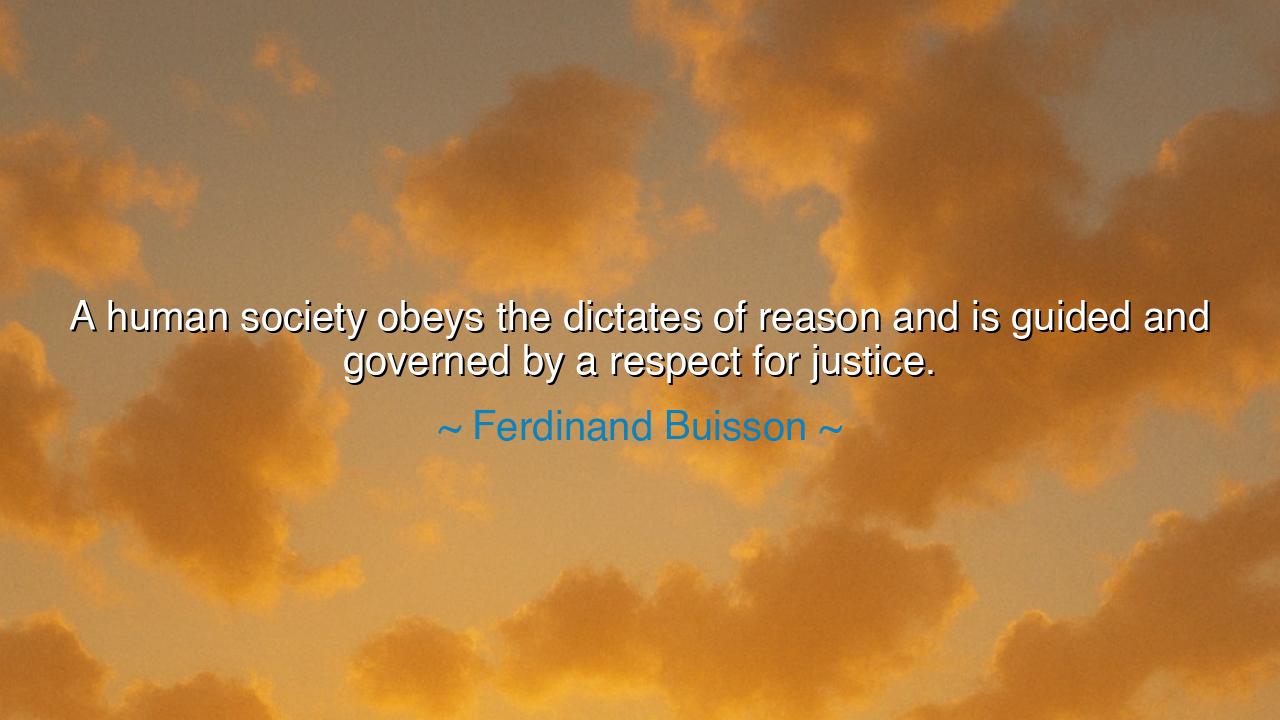
A human society obeys the dictates of reason and is guided and
A human society obeys the dictates of reason and is guided and governed by a respect for justice.






"A human society obeys the dictates of reason and is guided and governed by a respect for justice." These words from Ferdinand Buisson resonate deeply with the timeless wisdom that reason and justice are the bedrock of any thriving society. Buisson's statement calls us to reflect on the relationship between humanity's rational capacities and the essential virtue of justice, both of which must guide our interactions, governance, and the very structures of society. The true measure of a society is not in its wealth, its power, or its size, but in how it chooses to govern itself—whether it is guided by wisdom, fairness, and the pursuit of the greater good for all.
In the ancient world, philosophers like Plato and Aristotle stressed the importance of reason and justice in the development of a harmonious society. Plato, in his work The Republic, argued that the ideal society was one in which each individual knew their role and acted in accordance with reason, while justice reigned at every level of society. He famously described justice as each person performing the task for which they were best suited, in harmony with the reason that guided them. In this vision, a just society is not one of chaos, but one where reason governs, ensuring fairness and order for all. His teachings suggest that reason is not merely an intellectual exercise, but a moral guide—a force that aligns society with the higher principles of truth, fairness, and justice.
Likewise, Aristotle, in his work Nicomachean Ethics, further developed the connection between reason and justice, insisting that a just society is one where virtue and reason guide decisions for the benefit of all. Aristotle’s notion of justice was not confined to the laws of the state but extended to the moral obligations of individuals to each other. He understood that a society governed by reason and justice would foster flourishing—a life of moral excellence and shared well-being. Just as Buisson asserts, both reason and justice were seen as vital to building a society that not only survives but thrives, and one that fosters both individual and collective prosperity.
The story of Solon, the great Athenian lawgiver, provides a real-life example of the intersection between reason and justice in the governance of society. In 594 BC, Solon was chosen to reform the legal system of Athens, which was in turmoil due to the unequal distribution of wealth and power. Solon’s reforms were based on reason—they sought to balance the needs of the rich and poor, ensuring that no group could dominate the others. Solon’s reforms also introduced the concept of equality before the law, a radical idea at the time. He sought to establish justice through reasonable, well-thought-out laws that would provide fairness for all citizens. His work laid the groundwork for later democratic principles, showing how reason and justice are foundational to social stability and moral order.
In modern history, we see the same values at work in the lives of leaders like Nelson Mandela. Mandela’s journey was not just one of political struggle but also of moral reasoning and a deep commitment to justice. When he fought against apartheid, Mandela used reason to advocate for a society where justice would govern, where the rights of all individuals, regardless of race, would be recognized and respected. His commitment to justice, even in the face of imprisonment, demonstrates the power of a society built on the belief that reason and justice can overcome even the deepest divisions. Mandela’s leadership shows that the most powerful societies are those that do not just follow reason and righteous laws, but also respect the human dignity of all people.
The lesson we learn from Buisson’s quote is that reason and justice are not merely abstract ideals, but practical forces that must guide every aspect of a society. A society governed by reason does not merely seek to enforce laws, but to ensure that those laws are just and fair. Justice, in turn, is not an isolated concept but something that emerges from the minds of those who reason deeply and act ethically. To respect justice is to understand that it is not about rules alone, but about equality, human dignity, and compassion. A society that follows these dictates is one that stands as a beacon of hope, not just for its own people but for all of humanity.
In our own lives, we must strive to be governed by reason and justice—to allow these virtues to guide our decisions and our actions. Whether in the way we relate to others, how we approach leadership, or how we engage with society, we must seek to cultivate these principles within ourselves. We must recognize that reason does not mean cold logic but a moral reasoning that is aligned with the well-being of others, and that justice is not just fairness in law but equity and respect for every individual. In doing so, we contribute to building a society that, like those envisioned by the ancients, thrives not only through power or control but through the mutual respect and honor of all its members. Reason and justice should be the twin pillars on which we stand, both individually and collectively, as we move toward a more compassionate and balanced world.






AAdministratorAdministrator
Welcome, honored guests. Please leave a comment, we will respond soon